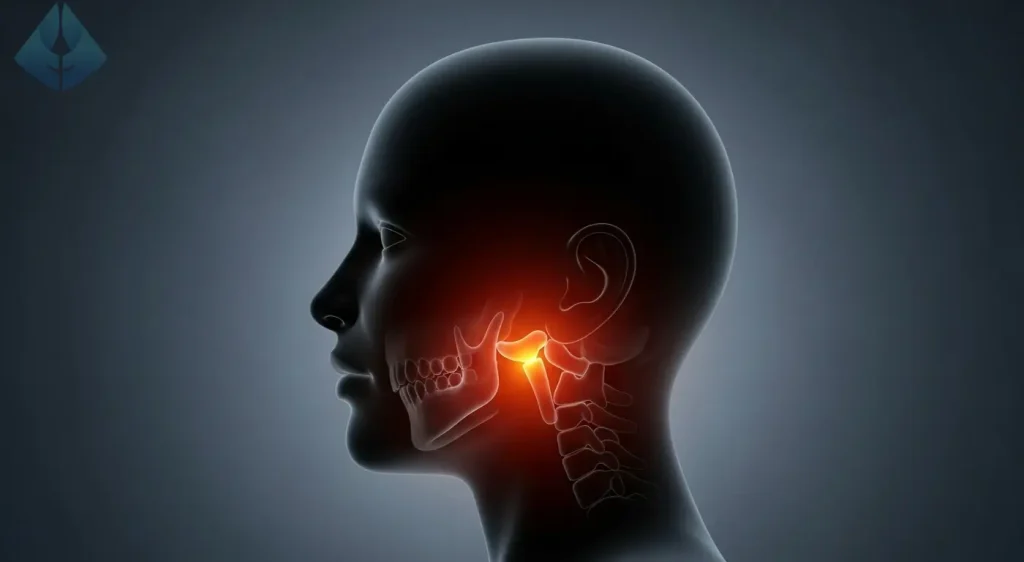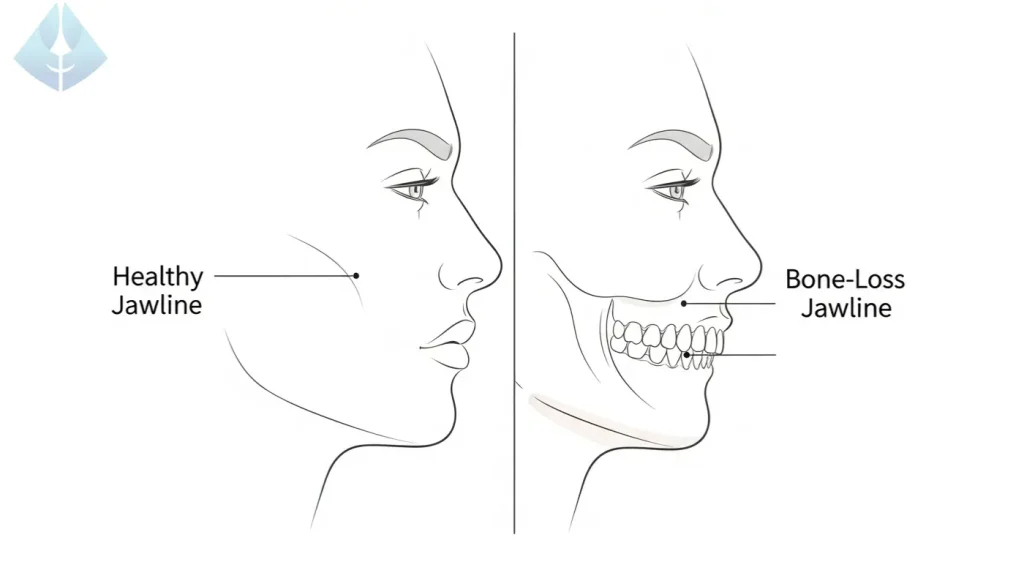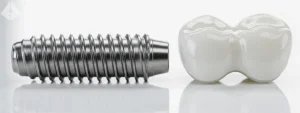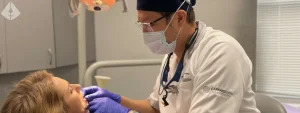Do you find yourself hesitating before biting into a crisp apple? Perhaps you’ve subtly started choosing softer foods at restaurants, avoiding your favorite steak or crunchy nuts. Indeed, these small adjustments might seem insignificant, but they are often the first whispers of a more significant underlying issue. Consequently, ignoring these whispers can lead to a cascade of dental problems. This article, therefore, provides a crucial checklist outlining the top signs you need dental implants, a permanent and life-changing solution offered by world-class cosmetic dentist Dr. Aristo Carranza at our Westfield, NJ, clinic.
For many, the journey begins with a missing tooth—perhaps from an old injury, decay, or gum disease. Initially, you adapt. However, the consequences of that empty space soon begin to surface. This isn’t just about aesthetics; in fact, it’s about function, health, and confidence. For this reason, understanding the subtle (and not-so-subtle) signals your body is sending is the first step toward reclaiming your smile’s full potential. Thus, we’ve created this definitive self-diagnostic guide. Let’s explore the seven key indicators that it’s time to consider dental implants.
1. The ‘Can’t-Bite-the-Apple’ Dilemma: Difficulty Chewing
This is perhaps the most common and telling sign. For instance, you notice a change in your ability to chew food properly and comfortably. Biting into hard foods like apples or carrots becomes a challenge, or you find yourself chewing exclusively on one side of your mouth to avoid discomfort or instability.
To clarify, this difficulty isn’t just an inconvenience; it’s a direct consequence of tooth loss. Your teeth are designed to work as a team, distributing the immense force of biting and grinding. When a tooth is missing, the surrounding teeth lose support and can begin to drift. Moreover, the jawbone in the empty space no longer receives the stimulation it needs from the tooth root, which in turn leads to bone loss. This weakens the entire structure, making it difficult to generate the force needed for effective chewing. As a result, you may start avoiding nutrient-rich foods that are harder to eat, which can ultimately impact your overall nutrition.
Dental implants, on the other hand, are the premier solution because they mimic a natural tooth from root to crown. The titanium implant post fuses with your jawbone—a process called osseointegration—creating an incredibly strong and stable foundation. This allows you to chew all your favorite foods with confidence and without hesitation, just as you would with your natural teeth.

2. Morning Discomfort: Unexplained Jaw Pain and Headaches
Do you wake up with a sore jaw, facial pain, or even tension headaches? You might attribute it to stress or a bad night’s sleep; however, it could be one of the critical signs you need dental implants. This is because a missing tooth disrupts the delicate balance of your bite (occlusion).
When a gap is present, the remaining teeth try to compensate. They may shift, tilt, or super-erupt (move further out of the gum) to fill the space. This misalignment then forces your jaw muscles to work harder and unevenly to bring your teeth together. Over time, this chronic strain on the temporomandibular joint (TMJ) and surrounding muscles can lead to persistent pain, clicking or popping sounds in the jaw, and even referred pain manifesting as headaches or neck and shoulder aches.
In contrast, by filling the gap and restoring proper alignment, a dental implant removes the source of the muscular strain. It provides a stable point of contact, allowing your jaw to function in a balanced, relaxed state. In fact, many patients of Dr. Aristo Carranza report a significant reduction or complete elimination of chronic jaw pain and headaches after their implant procedure.
3. A Changing Reflection: Noticeable Facial Collapse
Have you looked in the mirror lately and felt that your face looks… different? Perhaps a little more sunken, older, or asymmetrical? This isn’t your imagination. In reality, it’s a physiological process known as facial collapse, and it’s a serious consequence of tooth loss.
To understand why, your jawbone is what provides the underlying structure for your lower face, supporting your cheeks and lips. The roots of your teeth continuously stimulate the jawbone, signaling to your body to maintain its density and volume. When a tooth is lost, that stimulation ceases. As a result, the body, ever-efficient, begins to resorb the bone material in that area because it no longer serves a purpose. It’s estimated that you can lose up to 25% of the bone width in the first year after losing a tooth.
This bone loss leads to a visible sinking of the facial features, causing premature wrinkling around the mouth and a shorter, more pointed chin. This is why dental implants are not just a dental solution, but an anti-aging one. Because the implant post integrates directly with the bone, it resumes the vital stimulation that was lost, thereby halting further bone resorption and preserving your natural facial structure and youthful profile.
4. The Telltale Slur: Changes in Your Speech
Your teeth play a vital role in articulation. Specifically, they act as a physical barrier against which your tongue pushes to form certain sounds. Think of the “th,” “f,” or “v” sounds. Unquestionably, a gap, especially in the front of your mouth, can disrupt this delicate mechanic.
You might find yourself developing a slight whistle or a lisp when you speak. Certain words may become more difficult to pronounce clearly, which can cause you to feel self-conscious in conversations. While dentures can sometimes help, they can also slip or feel bulky, subsequently leading to their own set of speech impediments.
A dental implant, securely anchored in your jaw, feels and functions exactly like a natural tooth. There is no slippage, no clicking, and no bulky plastic. This allows you to speak clearly and naturally, restoring your confidence in both personal and professional settings. At our Westfield clinic, for instance, Dr. Carranza focuses on smile designs that perfect not only the look but also the function, ensuring your voice is heard without impediment.
5. The Domino Effect: Shifting and Drifting Teeth
Fundamentally, your teeth are held in a precise and stable alignment by their neighbors. When one is removed, for instance, it’s like taking a book off a tightly packed shelf—the others start to lean and shift into the newly available space. This “domino effect” is a major red flag and one of the most urgent signs you need dental implants.
This shifting can cause a host of new problems:
Gaps and Crowding: Previously straight teeth can become crooked and create new gaps.
Bite Problems: Additionally, the way your top and bottom teeth meet is altered, leading to issues discussed in point #2.
Increased Decay Risk: New, awkward spaces are created that are difficult to clean, trapping food and plaque and, by extension, increasing the risk of cavities and gum disease in healthy teeth.
An implant acts as a placeholder, securely holding the line and preventing this destructive chain reaction. In short, it protects the investment you’ve made in your other healthy teeth and prevents a single missing tooth from turning into a complex, full-mouth problem.
Dental Implants vs. Other Options: A Quick Comparison
Feature | Dental Implants | Dental Bridge | Partial Denture |
Bone Preservation | Yes, stimulates and preserves jawbone. | No, can lead to bone loss under the gap. | No, can accelerate bone loss. |
Impact on Other Teeth | None. Stands alone. | Requires grinding down two healthy teeth. | Can put strain and wear on adjacent teeth. |
Stability | Excellent. Fused to the bone. | Moderate. Cemented to adjacent teeth. | Poor to Moderate. Can shift while eating. |
Longevity | 25+ years, often a lifetime solution. | 5-15 years. | 5-10 years. |
Maintenance | Care for it like a natural tooth. | Requires special cleaning under the bridge. | Must be removed for cleaning. |
6. Denture Dissatisfaction: Loose or Ill-Fitting Prosthetics
For those who already have dentures or partials, daily frustration might be the biggest sign of all. Are you tired of using messy adhesives? Furthermore, do you avoid certain social situations for fear your dentures might slip while talking or laughing? And do you find it difficult to taste and enjoy your food fully because of a plastic plate covering your palate?
Thankfully, this is not a life sentence. In fact, it’s a clear indication that you are a prime candidate for an implant-supported solution. Because bone loss progresses (which dentures do not prevent), the fit of your prosthetic will continually worsen, requiring frequent relines and adjustments.
Dental implants can be used to anchor a full or partial denture, creating an “implant-retained” or “implant-supported” overdenture. This provides incredible stability—in other words, no more slipping, no more adhesives. Alternatively, a full arch of missing teeth can be replaced with a fixed bridge supported by just a few implants (e.g., an All-on-4® solution). This gives you a full set of permanent, non-removable teeth, restoring nearly 100% of your natural bite function.
7. The Confidence Crisis: Hiding Your Smile
Finally, the last sign on our checklist is emotional, but it is certainly just as real and valid as the physical ones. Do you, for example, consciously hide your smile in photos? Do you cover your mouth when you laugh? In essence, does the appearance of your teeth hold you back from living your life to the fullest?
A healthy, complete smile is intrinsically linked to our self-esteem. The psychological impact of missing teeth can be profound, often affecting your career, your relationships, and your overall happiness. You deserve to feel confident and proud of your smile.
Cosmetic dentistry, under the expert hands of Dr. Aristo Carranza, is about more than just teeth—it’s about transforming lives. A dental implant provides a solution that is indistinguishable from a natural tooth. Ultimately, it restores the harmony and beauty of your smile, giving you a powerful boost in self-confidence that radiates through every aspect of your life. It is the definitive step from hiding your smile to sharing it with the world.
Take the Next Step with an International Expert
Ultimately, recognizing these signs is the first step. Of course, the next is to seek a solution from a true professional. Dr. Aristo Carranza is an internationally recognized cosmetic dentist with a passion for creating perfect, functional, and lasting smiles. At his state-of-the-art clinic at drcarranza.com in Westfield, NJ, he utilizes the latest technology and a highly personalized approach to ensure every patient achieves their ideal outcome.
Don’t let another day go by compromising on your health, function, and confidence. If you’ve ticked one or more boxes on this checklist, the time to act is now.
Contact our Westfield, NJ office today to schedule your comprehensive consultation with Dr. Carranza and discover how dental implants can permanently restore your smile.









